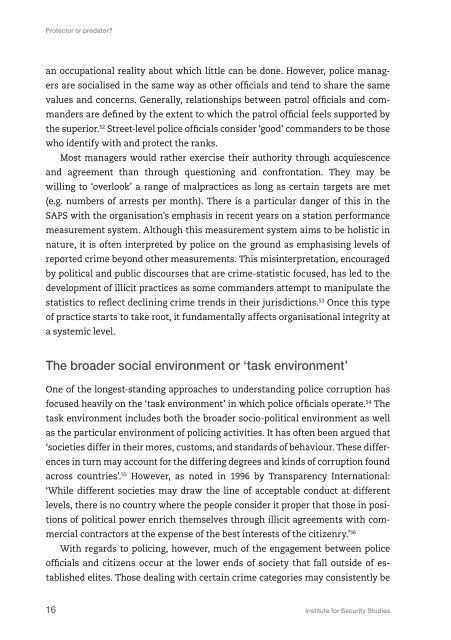Protector or predator? - Institute for Security Studies
Protector or predator? - Institute for Security Studies
Protector or predator? - Institute for Security Studies
Create successful ePaper yourself
Turn your PDF publications into a flip-book with our unique Google optimized e-Paper software.
<strong>Protect<strong>or</strong></strong> <strong>or</strong> predat<strong>or</strong>?<br />
an occupational reality about which little can be done. However, police managers<br />
are socialised in the same way as other officials and tend to share the same<br />
values and concerns. Generally, relationships between patrol officials and commanders<br />
are defined by the extent to which the patrol official feels supp<strong>or</strong>ted by<br />
the superi<strong>or</strong>. 52 Street-level police officials consider ‘good’ commanders to be those<br />
who identify with and protect the ranks.<br />
Most managers would rather exercise their auth<strong>or</strong>ity through acquiescence<br />
and agreement than through questioning and confrontation. They may be<br />
willing to ‘overlook’ a range of malpractices as long as certain targets are met<br />
(e.g. numbers of arrests per month). There is a particular danger of this in the<br />
SAPS with the <strong>or</strong>ganisation’s emphasis in recent years on a station perf<strong>or</strong>mance<br />
measurement system. Although this measurement system aims to be holistic in<br />
nature, it is often interpreted by police on the ground as emphasising levels of<br />
rep<strong>or</strong>ted crime beyond other measurements. This misinterpretation, encouraged<br />
by political and public discourses that are crime-statistic focused, has led to the<br />
development of illicit practices as some commanders attempt to manipulate the<br />
statistics to reflect declining crime trends in their jurisdictions. 53 Once this type<br />
of practice starts to take root, it fundamentally affects <strong>or</strong>ganisational integrity at<br />
a systemic level.<br />
The broader social environment <strong>or</strong> ‘task environment’<br />
One of the longest-standing approaches to understanding police c<strong>or</strong>ruption has<br />
focused heavily on the ‘task environment’ in which police officials operate. 54 The<br />
task environment includes both the broader socio-political environment as well<br />
as the particular environment of policing activities. It has often been argued that<br />
‘societies differ in their m<strong>or</strong>es, customs, and standards of behaviour. These differences<br />
in turn may account f<strong>or</strong> the differing degrees and kinds of c<strong>or</strong>ruption found<br />
across countries’. 55 However, as noted in 1996 by Transparency International:<br />
‘While different societies may draw the line of acceptable conduct at different<br />
levels, there is no country where the people consider it proper that those in positions<br />
of political power enrich themselves through illicit agreements with commercial<br />
contract<strong>or</strong>s at the expense of the best interests of the citizenry.’ 56<br />
With regards to policing, however, much of the engagement between police<br />
officials and citizens occur at the lower ends of society that fall outside of established<br />
elites. Those dealing with certain crime categ<strong>or</strong>ies may consistently be<br />
16<br />
<strong>Institute</strong> f<strong>or</strong> <strong>Security</strong> <strong>Studies</strong>

















